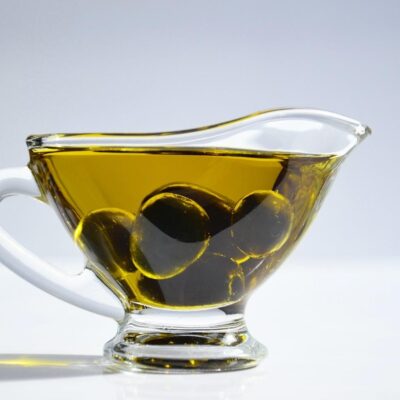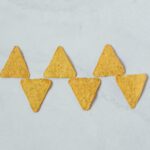Yes, in moderation it’s safe for dogs to consume olive oil. In fact, olive oil can have some health benefits for dogs, including healthy skin, improved digestion, immune system, coat, etc. Portions need to be regulated. Feeding them too much can introduce additional calories from fat into their system, leading to stomach issues and weight gain.

Safe: This food is generally considered safe by the veterinary community. Dogs can eat this food sometimes or in small amounts but contains little to no nutritional value.
| Food Safety | Safe to eat in moderation |
| Nutritional Value | Monounsaturated fats, polyphenols, carotenoids, vitamin E, omega-3 |
| Potential Risks | Weight gain, vomiting, diarrhea |
How Much Olive Oil Is Safe for Dogs?
A teaspoon of olive oil is generally acceptable for dogs weighing 20 to 50 pounds on occasion. If your dog weighs 90 pounds or more, you can give them a tablespoon from time to time. As with most foods, it’s advised to consult your vet around portion sizes, especially for puppies or dogs with health conditions.
How to Feed Olive Oil to Dogs
An easy way to introduce olive oil into your dog’s diet is to add a couple of teaspoons to its daily meal. You can mix it in with their regular food or drizzle it on top.
What About Foods Fried or Cooked In Olive Oil?
When olive oil reaches its smoking point around 350 degrees Fahrenheit, which may happen on foods cooked in the oven or frying pan, the compounds that are generally nutritious break down.
Most foods fried in olive oil are also breaded or are heavily seasoned, so it’s best to avoid these foods as servings or treats.
What Happens if Your Dog Eats Too Much Olive Oil?
If your dog eats too much olive oil, it can negatively affect it, especially if your canine companion has a sensitive gastrointestinal tract or stomach. If you observe your dog vomiting or experiencing diarrhea after drinking olive oil, stop providing it to them. Furthermore, olive oil is very high in calories from fats. So, if your dog has pancreatitis, the excess fat may trigger a flare-up.
Frequently Asked Questions
-
Both regular and extra virgin olive oil are great sources of healthy nutrients and fats for dogs. In fact, some dog food types already contain olive oil as a preservative. Hence, it is safe for dogs!
-
Yes, adding olive oil to your dog’s food is completely fine if you do it in moderation. Typically, keep it below a single teaspoon per meal.
-
There’s a variety of flavored olive oils available at stores and farmers marked but generally speaking they are not recommended for dogs. Most will have concentrated amounts of as herbs, juices, spices, or other additives that could be a concern.







